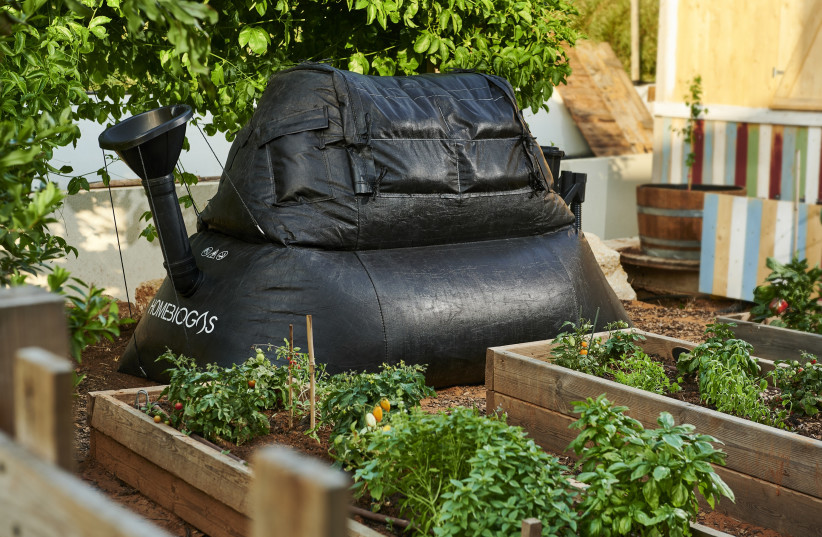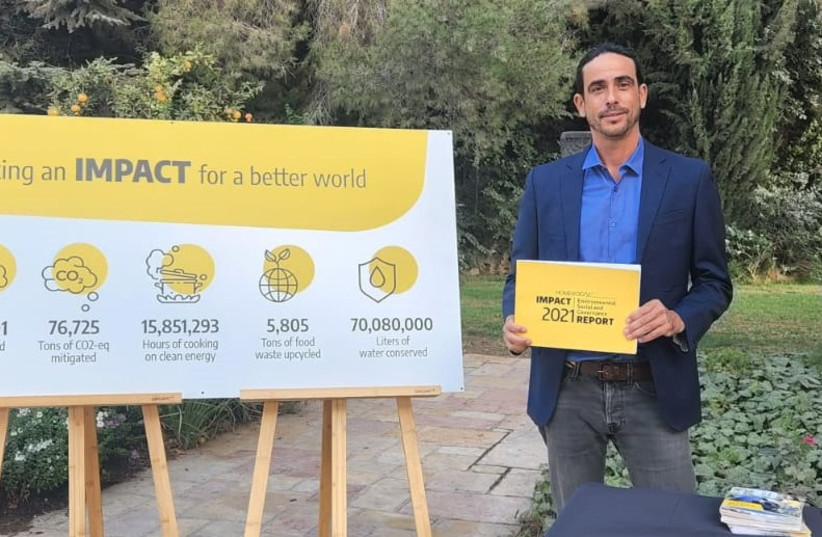The climate-tech company has been chosen to represent Israel as part of a delegation to the upcoming COP27 conference in Egypt.
Published: NOVEMBER 2, 2022 16:20

Walking through the front gate of HomeBiogas’s office in Beit Yanai (a moshav a stone’s throw from Netanya), you wouldn’t immediately recognize it as the home of one of the nation’s foremost, globally-recognized tech solutions.
A row of smart, well-constructed standalone offices sits to the left, built with plywood and finished lumber. A larger main office is on the right, built with up-cycled, reclaimed materials, that gives off a wood cabin appearance (if you notice hanging pots overflowing with fresh tea leaves, basil and thyme, you’ve gone a tad too far).
And dead ahead – behind the outdoor kitchenette – is a sizable stretch of garden, lush with edible greenery and home to several models of the company’s proprietary product: a self-contained “biogas digester” which converts organic waste into both liquid fertilizer and natural gas.
Taking a stroll of the facility, you’d notice that the unit’s liquid fertilizer output can be hooked up directly into a garden’s drip irrigation system, resulting in healthy, bombastic patches of crops feeding off of your up-cycled food scraps. The gas it produces would cook your lunch (on a company-branded stove top) – and if you decide to take your bike to work, it might heat the water in your on-premises shower (located right behind the composting toilet stall).
Many climate-tech companies “talk the talk” of solving global environmental issues and combating climate change, but on nearly every level – from use of its own product to its monthly meetings on improving the office’s self-sustainability – HomeBiogas walks the walk.
So much so, in fact, that the company has been selected as one of ten that will represent the State of Israel and its climate solutions on the global stage next week at the United Nations annual Climate Change Conference (better known as COP27 – Conference of the Parties #27) in Sharm e-Sheikh, Egypt.
Yair Teller, president and co-founder of HomeBiogas, at President Herzog’s home in advance of COP27 (credit: HOMEBIOGAS)
What is HomeBiogas?
SINCE THE announcement last month declaring them as part of Israel’s COP27 delegation, the company has been working swiftly to prepare which aspects of their company they want to highlight on the global stage.
“We don’t typically show what’s going to be in the future. We like to show real impact and where we can collaborate with organizations, governments and the private sector,” according to Yair Teller, co-founder of HomeBiogas. “Every person that buys a system – we’re partners with them in making real change.”
“We don’t typically show what’s going to be in the future. We like to show real impact and where we can collaborate with organizations, governments, and the private sector. Every person that buys a system — we’re partners with them in making real change.”Yair Teller
Teller is the original innovator who came up with the HomeBiogas core concept. He sat with me for an interview, before he needed to run out to another meeting – with President Isaac Herzog.
As a student of marine biology, Teller became fascinated with the conversion of organic waste into natural gas when, during his time traveling through the mountains of India, he came across a family who used natural gas to cook their meals rather than animal excrement or charcoal as most people in the region did.
“I asked them, ‘okay, you’re in the middle of the mountains – where are you getting your gas from?’” Teller recalled. “They showed me a hole [they had dug] near their home, where they would throw in their animal manure, and it would produce gas which they [captured and] used to power their stove.”
Seeing that families use their waste as a clean resource to cook their meals was a eureka moment for Teller. “From that moment I was obsessed,” he said. Upon returning to Israel, he pivoted his academic studies and career focus toward creating a system that would enable people around the world to do the same thing in a convenient, efficient and manageable way.
TEN YEARS later, HomeBiogas has developed a series of easily-installed composters in a range of models suitable for homes, restaurants and agricultural facilities, and has sold 20,000 units around the globe. Teller pointed out that HomeBiogas has the potential to make a huge impact on the climate in a variety of ways, from reducing energy spent on transporting organic waste to landfills, to preventing water contamination due to waste dumping and saving trees from becoming cooking fuel in rural areas – thereby reducing the risk of respiratory disease caused by indoor pollution at the same time.
Hundreds of HomeBiogas units are also now being used by education centers throughout Israel and worldwide in order to give students a hands-on example of the impact that innovative ideas can have on the world and its health.
“Gandhi said ‘Be the change’ – we are the change. We have this technology in our houses. Now we need to teach the change that we want to see in the world,” Teller said.
“What do teenagers talk about these days? They talk about the climate; that’s what they care about and they know they need to change it. So they need access to tools to learn – anything that is interesting, that is innovative, that is hands-on, that is not only writing on the blackboard in the classroom. That’s very important.”
For Teller, the company’s mission to impact the climate isn’t just business – it also serves a more personal aspiration. I asked him if he considers his work an environmentalist act.
“Yes, I’m an environmentalist, but…” the environmental entrepreneur said, stopping himself mid-sentence. “No, it’s not environmentalism. I just want my grandchildren to have a good life, and this is my way of making that happen.”
https://www.jpost.com/environment-and-climate-change/article-721295

